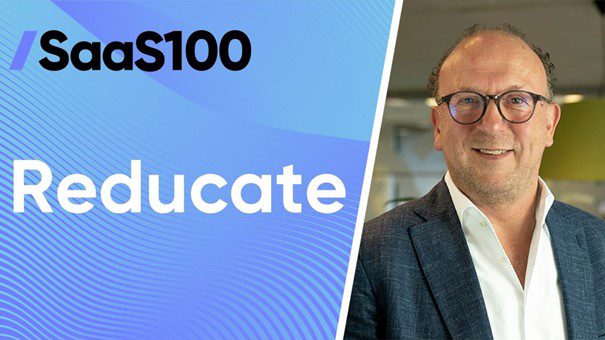Published by MTSprout on May 30, 2023 – With little competition, a steady stream of monthly revenue, and a product that is immune to economic downturns, Reducate’s business model seems almost too good to be true. “We are approached by investors every two weeks,” says CEO Hans van Veggel.
Van Veggel’s company was named the best performing SaaS company in the Netherlands on Thursday evening. Reducate is the result of a merger between the Dutch company E-WISE and its Danish counterpart, Blueprint Learning, nearly a year ago. The company focuses on a niche within the e-learning market.
“Various professions require mandatory continuing education,” says Van Veggel. “A well-known example is the general practitioner, who must complete at least 200 hours of training every five years. For each hour, they receive a credit point. Failure to comply with these requirements results in losing their license.” There are other professional groups that also have these requirements, such as accountants, tax advisors, notaries, as well as the education and childcare sectors.
Van Veggel recognized the potential of online learning early on. With E-WISE, he became the first company in Europe to be officially accredited for offering online continuing education in 2002. At the time, this concept was groundbreaking. Reducate’s focus is on accredited courses. You won’t find courses on how to enhance your LinkedIn profile or improve your public speaking skills in their offerings. The company targets a different segment of e-learning than providers like GoodHabitz and Springest.
“Our potential target audience is slightly smaller, but we have a very steady market. Even when the economy is not doing well, the demand for our courses remains stable because our platform’s users are required to follow them due to their profession.”
Due to this mandatory nature, Reducate has ignored the Individual Learning Budget Scheme (STAP-budget) in recent years, unlike other e-learning platforms.
Minimal Competition
The customer base of Reducate is diverse, ranging from independent physiotherapists to pharmacy chains with thousands of employees. Each finds their own vertical with accredited courses on the platform, and the earned credits are automatically recorded.
According to Van Veggel, there is little competition. The stringent requirements for mandatory continuing education deter many other providers. “A course for a lawyer must meet 100% of the requirements; anything less is not sufficient. That is a different level compared to an e-training course on social media.”
“Moreover, we offer a segmented vertical for each professional group, which is highly comprehensive. Therefore, customers have little reason to go to another provider for part of their continuing education.”
The All-You-Can-Eat Model
Right from the start, Van Veggel decided to offer courses on an all-you-can-eat basis. This was a Netflix-style model before Netflix even adopted it. Van Veggel considers it the most important decision he has made in the past twenty years.
“Unlimited choices from a high-quality selection. Nowadays, this model is very common, but back then, it was quite unusual. Why did we choose it? I saw more value in creating loyal, happy customers than selling individual courses each time. It was a gamble that paid off, and I admit: we had good timing.”
Buy and Build
The biggest change for the company came last year when E-WISE merged with Blueprint Learning from Denmark. Both brands continue to operate under the same umbrella in their respective countries. Reducate serves as the parent company for their European expansion plans, which are already in motion.
“The merger was the prelude to the buy and build strategy we have planned. Towards the end of last year, we acquired a Dutch platform called E-learning Made Easy (EME). Soon, we expect to announce our next acquisition,” says Van Veggel.
The company sees rapid growth as a crucial condition for sustainability. “The requirements for the platform are getting higher and higher. This includes security, integration capabilities, and additional features. It requires substantial IT investments, and scalability is essential.”
The rapid advancement of artificial intelligence also plays a role. Van Veggel sees this technology as an opportunity to personalize their learning offerings even more in the near future.
Private Equity
So far, the company has financed its acquisitions internally. However, Van Veggel does not rule out the possibility of partnering with private equity in the future. If that happens, he will likely have plenty of options to consider. “We currently receive an average of one investor inquiry every two weeks,” says Van Veggel.


